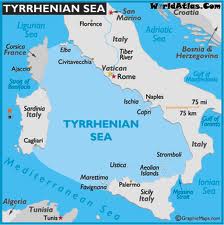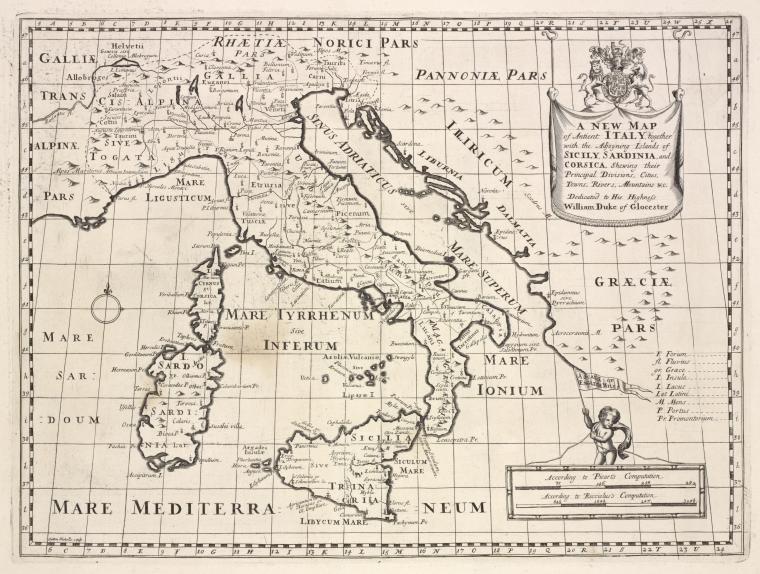Joseph Warren Wells
Tyrrhenian Sea
>The Tyrrhenian Sea according to Massimo Pittau was named after the Sardinian Nuragics, since in ancient Greek ‘Tyrrenoi’ means ‘builders of towers’. As noted elsewhere, Sardinia was an important part of the Atlantean domain.<
Plato clearly states that Atlantis controlled Europe as far as Tyrrhenia (Critias 114c), which implies that they dominated the southern half of the Italian peninsula. The Sea is surrounded by the islands of Corsica, Sardinia, Sicily and the Lipari Islands as well as continental Europe in the form of the Italian mainland. Not only does it contain islands with an adjacent continent (see Timaeus 24e). It is also accessed through the straits of Messina and Sicily, both of which have been identified as locations for the Pillars of Heracles before Eratosthenes applied that appellation to the region of Gibraltar.
Timaeus 24e-25a as translated by Bury reads “there lay an island which was larger than Libya and Asia together; and it was possible for the travellers of that time to cross from it to the other islands, and from the islands to the whole of the continent over against them which encompasses that veritable ocean (pontos=sea). For all that we have here, lying within the mouth of which we speak, is evidently a haven having a narrow entrance; but that yonder is a real ocean (pelagos=sea), and the land surrounding it may most rightly be called, in the fullest and truest sense, a continent.” Similarly, Lee and Jowett have  misleadingly translated both pontos and pelagos as ‘ocean’, while the earliest English translation by Thomas Taylor correctly renders them as ‘sea’. Modern translators such as Joseph Warren Wells and a Greek commentator George Sarantitis are both quite happy to agree with Taylor’s translation. However, Peter Kalkavage translates pontos as ‘sea’ but pelagos as ‘ocean’!
misleadingly translated both pontos and pelagos as ‘ocean’, while the earliest English translation by Thomas Taylor correctly renders them as ‘sea’. Modern translators such as Joseph Warren Wells and a Greek commentator George Sarantitis are both quite happy to agree with Taylor’s translation. However, Peter Kalkavage translates pontos as ‘sea’ but pelagos as ‘ocean’!
For me, there is a very strong case to be made for identifying the Tyrrhenian Sea as the ‘sea’ referred to by Plato in the passage quoted above. However, it was probably F.Butavand, in 1925, who first proposed the Tyrrhenian as the sea described by Plato in his La Veritable Histoire de L’Atlantide[205] .
Pushing the boat out a little further, I note that Rome is situated in Central Italy and by tradition was founded by the twins Romulus and Remus!
A 1700 map of the Tyrrhenian Sea is available online.
‘Tyrrhenia’ is sometimes used as a geological term to describe a sunken landmass in the Western Mediterranean Basin(b)(c).
(a) (link broken) *
Wells, Joseph Warren *
Joseph Warren Wells is an American computer software expert specialising in Internet  security. He has also been engaged in over 30 years of Greek and 20 years of Coptic studies. He is probably best known for his Sahidica trilogy which deals with the New Testament in the Sahidic dialect of pre-Islamic Coptic(a).
security. He has also been engaged in over 30 years of Greek and 20 years of Coptic studies. He is probably best known for his Sahidica trilogy which deals with the New Testament in the Sahidic dialect of pre-Islamic Coptic(a).
Wells has also contributed to Atlantology with a number of useful works that includes a concordance of the Atlantis texts of both the Bury and Jowett translations, which can be downloaded as an e-book(b) for less than €3. A free download of just the Jowett translation plus a concordance is also available(c).
Wells has also written about sexual elements contained in the Atlantis narrative.
2011 saw Wells add to his valuable contribution to Atlantis research with the publication of Atlantis in Context[787]and a slightly condensed edition of it, The Book on Atlantis[783]. In them, he offers a new translation of the Atlantis passages in Plato’s Critias and Timaeus and more importantly engages in a forensic examination of Timaeus 24e-25d, which contains some of the most debated elements in the narrative. However, I was disappointed that he did not expand on Plato’s use of words for various bodies of water and in particular the reference to the ‘ocean’ being navigable in those days, inferring that it was no longer so, which begs the question of how this could possibly refer to what we know as the Atlantic Ocean. That aside, Atlantis in Context is an important addition to Atlantis studies.
A 2008 version of his valuable Atlantis work entitled Plato’s Atlantis is still available online(f). This edition also includes a useful concordance to Jowett’s translation of the Atlantis narrative.
On an older website of his, Wells offered parallel versions of a section of Timaeus by Jowett, Bury, Lee and his own(d).
Wells has also brought together the Greek text as well as seven translations of the most quoted Atlantis passages in Timaeus from 24d to 25d, now available on the AtlantisOnline website(e).
Despite all that, Wells does not appear to support the reality of Atlantis!
(a) https://www.logos.com/product/5965/sahidic-coptic-collection
(b) https://www.lulu.com/product/file-download/a-concordance-for-platos-atlantis-burys-and-jowetts-translations/779346?productTrackingContext=product_view/more_by_author/right/2 (Link broken) *
(d) https://web.archive.org/web/20070217220641/https://www.greekatlantis.com:80/timaeus4.html
(e) https://atlantisonline.smfforfree2.com/index.php/topic,3584.0.html
Concordance *
A Concordance to the English language translations by R.G. Bury and Benjamin Jowett of the Atlantis sections of Plato’s Critias and Timaeus has been produced[702] by Joseph Warren Wells. It was available both in hard copy and as an inexpensive Internet download(a) but does not appear to be currently available. Wells has published separately details of the sources he employed in compiling this work(e).
A 2008 version of Wells’ valuable Atlantis work entitled Plato’s Atlantis is still available online(f). This edition also includes a useful concordance of Jowett’s translation of the Atlantis narrative.
Wells is also the author of a short paper on the sexual undertones in the Atlantis narrative(d).
Other online concordances to Timaeus and Critias are also available(b)(c).
(a) https://stores.lulu.com/josephwells (Link broken)
(b) https://web.archive.org/web/20171012030448/https://www.doc.ic.ac.uk/~rac101/concord/texts/timaeus/
(c) https://web.archive.org/web/20171028204206/https://www.doc.ic.ac.uk/~rac101/concord/texts/critias/
(d) https://greekatlantis.warpco.com/Sexcentric.html (offline 10.07.14)
(e) https://groups.yahoo.com/group/AtCon/message/2 (link broken) *
(f) Plato’s Atlantis | Atlantis FYI

